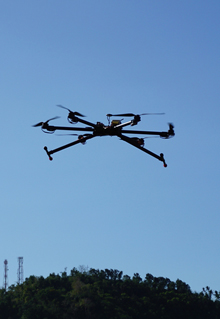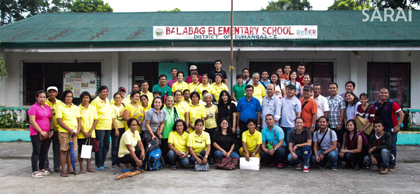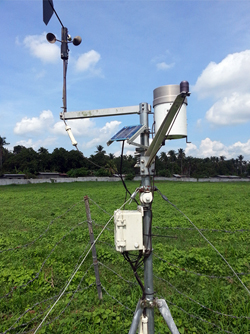 The effects of climate change are getting worse every second. Countries near the Pacific Ocean like the Philippines now have strong typhoons that people have not experienced nor anticipated. Long term changes in the temperature and precipitation pattern lead to prolonged droughts or El Niño events and increased floods or La Niña episodes. Increase in climatic variability leads to shift in production season and pest and disease patterns that threaten agricultural productivity and stability of crops and animals that are sensitive to variations in their environment.
The effects of climate change are getting worse every second. Countries near the Pacific Ocean like the Philippines now have strong typhoons that people have not experienced nor anticipated. Long term changes in the temperature and precipitation pattern lead to prolonged droughts or El Niño events and increased floods or La Niña episodes. Increase in climatic variability leads to shift in production season and pest and disease patterns that threaten agricultural productivity and stability of crops and animals that are sensitive to variations in their environment.
With all the undesirable climate change effects in agriculture, the Philippine Council for Agriculture, Aquatic and Natural Resources Research and Development of the Department of Science and Technology (DOST-PCAARRD) initiated and funded programs and projects addressing the negative effects of climate change in the agriculture, aquatic, and natural resources sectors through the utilization of modern tools and techniques or Smarter Agriculture. One of these initiatives under the Smarter Agriculture is the "Smarter Approaches to Reinvigorate Agriculture as an Industry in the Philippines (SARAI)" program, which is led by the University of the Philippines Los Baños.
The three-year program, which started in 2013, has five component projects. Its main objective is to provide a decision support system (e.g. crop advisories, forecasts, and management) in dealing with climate change effect in the agricultural sector using advances in S&T. The program will help farmers and decision makers come up with sound and science-based judgments under certain situations. As of 2015, the program has already produced outputs that can be grouped into five categories: technologies, systems, data products, and networks or linkages.
 The program has developed Smarter Pest Identification Technology (SPId Tech), a mobile application that can identify agricultural pests in the field using image scanning. After identification, a pest advisory and management will be recommended to the user. Another technology developed is a Cost-efficient Soil Moisture Monitoring System for Soil Water Deficit. Arduino-based moisture meters and gypsum blocks were fabricated using locally available materials for measuring and monitoring soil moisture in the different experimental sites throughout the country.
The program has developed Smarter Pest Identification Technology (SPId Tech), a mobile application that can identify agricultural pests in the field using image scanning. After identification, a pest advisory and management will be recommended to the user. Another technology developed is a Cost-efficient Soil Moisture Monitoring System for Soil Water Deficit. Arduino-based moisture meters and gypsum blocks were fabricated using locally available materials for measuring and monitoring soil moisture in the different experimental sites throughout the country.
The program has also produced the Water Management Decision Support System (WAISS), Smarter Agriculture Enhanced Agricultural Monitoring System (SEAMS), and Maize Nutrient Expert. WAISS is a model developed for estimating soil moisture deficit in annual crops like rice and corn that can provide an early warning for crop water stress. On the other hand, SEAMS is a system that can monitor on near-real time basis, the actual area planted to a crop and its condition based on free and daily updated satellite images available. Lastly, Maize Nutrient Expert is a system that provides a comprehensive farm analysis – from specific NPK applications to a comparison of the profit of farmers’ practice and the recommended practice – to determine proper site-specific fertilization level in any corn farm in the country.
 Crop suitability maps for rice, corn, banana, coconut, coffee, and cacao were also produced by the program. These maps that serve as decision support tools at a scale usable by farmers and LGUs show three categories of crop production suitability – high, moderate, and marginal. To aid in the statistical modelling for the crop forecasts and advisories, SARAI uses Automatic Weather Stations (AWS) and Unmanned Aerial Vehicle (UAV) to provide real-time weather data.
Crop suitability maps for rice, corn, banana, coconut, coffee, and cacao were also produced by the program. These maps that serve as decision support tools at a scale usable by farmers and LGUs show three categories of crop production suitability – high, moderate, and marginal. To aid in the statistical modelling for the crop forecasts and advisories, SARAI uses Automatic Weather Stations (AWS) and Unmanned Aerial Vehicle (UAV) to provide real-time weather data.
SARAI, as a Smarter Agriculture system, is envisioned to become a research hub, attracting researchers and institutions in contributing to the improvement of existing modules or in the development of new ones.
DOST-PCAARRD will showcase Smarter Agriculture technologies including other agri-aqua research and development (R&D) outputs on March 2-4, 2016 during the SIPAG FIESTA at its headquarters in Los Baños, Laguna.
SIPAG, a technology transfer strategy, embodies the Council’s commitment to DOST’s Outcome One in a bid to ensure that the fruits of R&D activities for the science and technology (S&T) agri-aqua sectors will be a blessing for every Juan.
